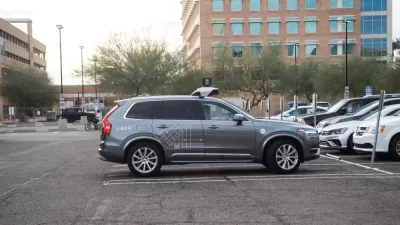California's loss is Arizona's gain. That's how Arizona Gov. Doug Ducey see's Uber's decision on Thursday to haul their fleet of self-driving Volvos from San Francisco to Arizona after the company refused to secure the necessary operating permits.
"Uber is moving its self-driving pilot project to Arizona, one day after the California Department of Motor Vehicles ordered the autonomous vehicles off the roads in San Francisco," reports Trisha Thadani for the San Francisco Chronicle.
A week earlier, the DMV had sent Uber a letter ordering the transportation network company to cease operation of its self-driving cars until it complies with regulations, meaning it had to secure an autonomous vehicle testing permit. The state Attorney General's office chimed in as well.
In the above KTVU news broadcast, former Chronicle columnist Chuck Nevis speculates why Uber chose not to comply with DMV's order to properly register the vehicles, and ponders the effect the move will have on San Francisco and Oakland, where it is based and expanding to, respectively.
"It seems strange, doesn't it, because the city said all you have to do is buy a permit; we'll give it to you in 72 hours, and you are in business," Nevius tells Ted Rowlands of KTVU. "But I think the deeper issue was that Uber didn't want to share the data that would be gathered."
Nevius indicates that there would need to be an incident report for when the driverless car went through the redlight, "and you saw the uproar that caused." Rowlands adds, "Uber went up against the SF Bike Coalition — not a good deal — might as well go up against the mob," referring to the group's political strength.
Uber's Vice President of Engineering, Anthony Levandowski, provided this statement to explain why they refused to secure the permits the DMV required for their autonomous vehicles.
California's loss is Arizona's gain?
A 19-photo slide gallery in the article shows the automated vehicles loaded on a flatbed truck for their journey to Arizona. While the destination city wasn't known, the cars were reported to have been seen in Phoenix.
“Phoenix is excited to be an Uber-friendly city, and we are excited that they are expanding here,” said Robbie Sherwood, a spokesman for the Phoenix mayor’s office.
"In a statement Thursday, Arizona Gov. Doug Ducey called California’s regulations burdensome and said Arizona welcomes Uber’s self-driving car test with 'open arms,'" adds Thadani.
“While California puts the brakes on innovation and change with more bureaucracy and more regulation, Arizona is paving the way for new technology and new businesses,” he said.
No special regulations for autonomous vehicles in Arizona.
Ducey signed an executive order in 2015 that supports the testing and operation of self-driving cars in Arizona. Google began testing its autonomous cars in several cities there this year.
For self-driving vehicles in Arizona, “there are no special permits or licensing required,” according to the state’s Department of Transportation. “In Arizona, autonomous vehicles have the same registration requirements as any other vehicle, and nothing in state law prevents testing autonomous vehicles.”
Academic relationships forged, as Uber did in Pittsburgh.
"Uber said last year that Tucson and the University of Arizona will become “the next home to our Uber mapping test vehicles.”
Uber's relationship with Carnegie Mellon University in Pittsburgh, where Uber first began testing of self-driving vehicles in September, turned out to be stormy. It "partnered with one of the most advanced university robotics labs in the US last year—only to immediately poach a third of its top scientists and its director," writes Jordan Pearson for Motherboard.
Speaking of regulations....
This isn't the first time the Grand Canyon State and the Golden State have found themselves on opposite sides of regulation of an industry. A year after California made history by banning the single-use disposable bag (and voters upheld the ban in a referendum in November, bankrolled by the plastics industry), Gov. Ducey signed a bill that outlawed local governments from banning single-use plastic bags
+++++++++++++++++++
Related on Planetizen:
FULL STORY: Uber sending self-driving cars to Arizona

Maui's Vacation Rental Debate Turns Ugly
Verbal attacks, misinformation campaigns and fistfights plague a high-stakes debate to convert thousands of vacation rentals into long-term housing.

Planetizen Federal Action Tracker
A weekly monitor of how Trump’s orders and actions are impacting planners and planning in America.

In Urban Planning, AI Prompting Could be the New Design Thinking
Creativity has long been key to great urban design. What if we see AI as our new creative partner?

King County Supportive Housing Program Offers Hope for Unhoused Residents
The county is taking a ‘Housing First’ approach that prioritizes getting people into housing, then offering wraparound supportive services.

Researchers Use AI to Get Clearer Picture of US Housing
Analysts are using artificial intelligence to supercharge their research by allowing them to comb through data faster. Though these AI tools can be error prone, they save time and housing researchers are optimistic about the future.

Making Shared Micromobility More Inclusive
Cities and shared mobility system operators can do more to include people with disabilities in planning and operations, per a new report.
Urban Design for Planners 1: Software Tools
This six-course series explores essential urban design concepts using open source software and equips planners with the tools they need to participate fully in the urban design process.
Planning for Universal Design
Learn the tools for implementing Universal Design in planning regulations.
planning NEXT
Appalachian Highlands Housing Partners
Mpact (founded as Rail~Volution)
City of Camden Redevelopment Agency
City of Astoria
City of Portland
City of Laramie




























